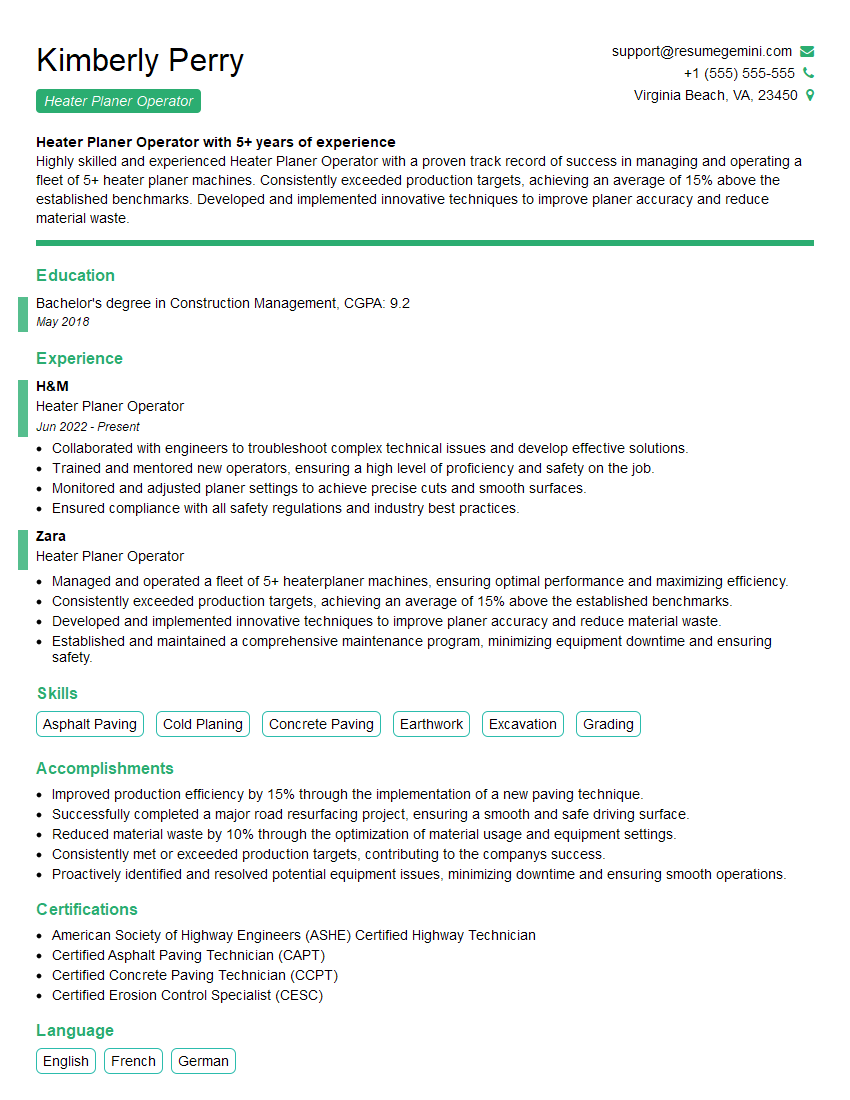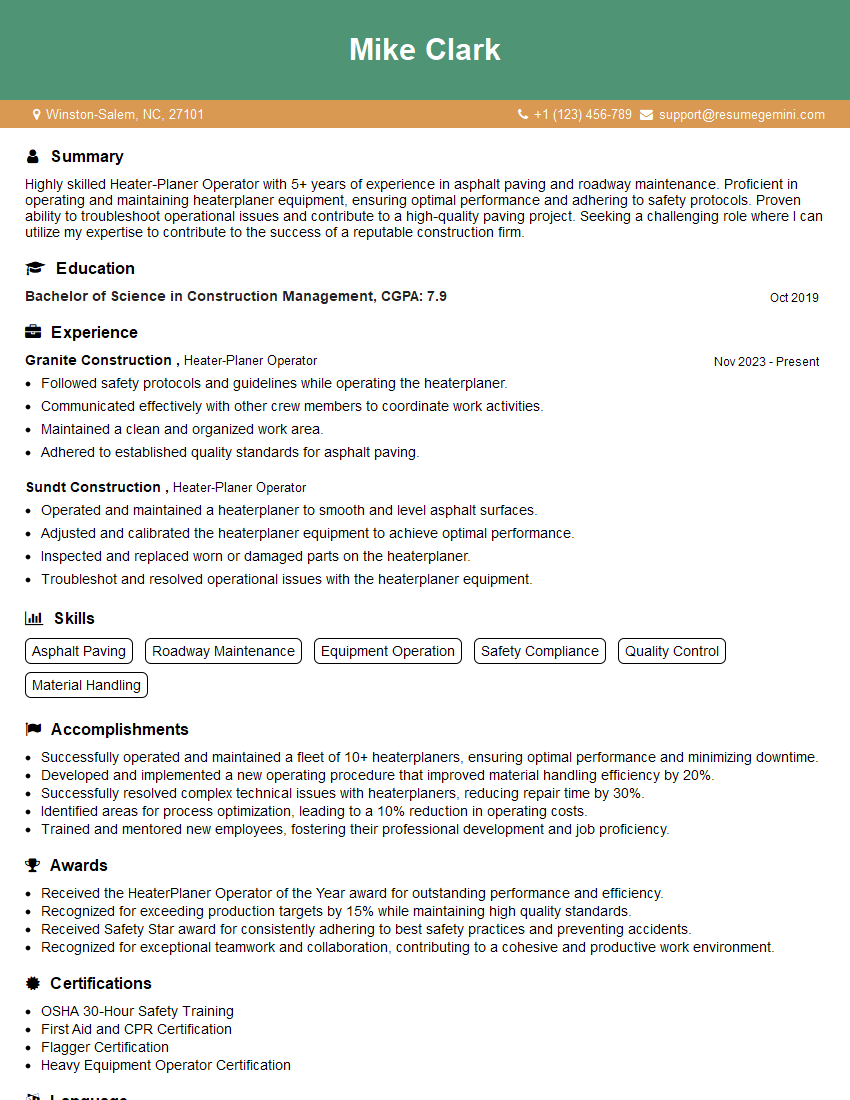Are you gearing up for a career shift or aiming to ace your next interview? Look no further! We’ve curated a comprehensive guide to help you crack the interview for the coveted Heater Planer Operator position. From understanding the key responsibilities to mastering the most commonly asked questions, this blog has you covered. So, buckle up and let’s embark on this journey together.
Acing the interview is crucial, but landing one requires a compelling resume that gets you noticed. Crafting a professional document that highlights your skills and experience is the first step toward interview success. ResumeGemini can help you build a standout resume that gets you called in for that dream job.
Essential Interview Questions For Heater Planer Operator
1. What are the key responsibilities of a Heater Planer Operator?
The key responsibilities of a Heater Planer Operator include:
- Operating and maintaining heater planer equipment
- Setting up and aligning the planer for optimal performance
- Monitoring the planing process and making adjustments as needed
- Inspecting and maintaining the planer equipment to ensure safe and efficient operation
- Troubleshooting and resolving any problems that may occur during the planing process
2. What are the different types of heater planers?
Electric Heater Planers
- Compact and portable
- Ideal for small to medium-sized planing jobs
- Lower power output compared to gas-powered models
Gas-Powered Heater Planers
- More powerful than electric models
- Suitable for large-scale planing jobs
- Require proper ventilation due to exhaust fumes
3. What are the safety precautions that must be taken when operating a heater planer?
When operating a heater planer, it is important to take the following safety precautions:
- Wear appropriate personal protective equipment (PPE), including safety glasses, gloves, and hearing protection
- Inspect the planer equipment before each use to ensure it is in good working order
- Operate the planer in a well-ventilated area
- Keep hands and loose clothing away from the planer blades
- Follow all manufacturer’s instructions for safe operation
4. How do you determine the correct feed rate for a heater planer?
The correct feed rate for a heater planer depends on several factors, including:
- Type of wood being planed
- Hardness of the wood
- Thickness of the wood
- Desired finish
It is important to experiment with different feed rates to find the optimal setting for the specific job.
5. What are the common problems that can occur when operating a heater planer?
Some common problems that can occur when operating a heater planer include:
- Planer knives becoming dull or damaged
- Planer table becoming uneven or damaged
- Motor overheating
- Excessive vibration
- Wood being torn or splintered
It is important to be able to troubleshoot and resolve these problems to ensure the safe and efficient operation of the planer.
6. How do you maintain a heater planer?
To maintain a heater planer, it is important to:
- Clean the planer regularly to remove sawdust and debris
- Sharpen or replace planer knives as needed
- Lubricate the planer according to the manufacturer’s instructions
- Inspect the planer regularly for any signs of damage or wear
- Store the planer in a dry, clean place when not in use
7. What are the different applications for heater planers?
Heater planers are used in a variety of applications, including:
- Removing old paint or varnish from wood surfaces
- Leveling uneven wood surfaces
- Smoothing rough wood surfaces
- Creating decorative effects on wood surfaces
8. What are the advantages of using a heater planer?
Heater planers offer several advantages over traditional planers, including:
- Faster planing speed
- Reduced sniping and tear-out
- Improved surface finish
- Easier to use and control
9. What are the disadvantages of using a heater planer?
Heater planers also have some disadvantages, including:
- Higher cost than traditional planers
- Require more maintenance
- Can be more dangerous to operate
10. How do you choose the right heater planer for the job?
When choosing a heater planer, it is important to consider the following factors:
- Size of the job
- Type of wood being planed
- Desired finish
- Budget
It is also important to read reviews and compare prices before making a purchase.
Interviewers often ask about specific skills and experiences. With ResumeGemini‘s customizable templates, you can tailor your resume to showcase the skills most relevant to the position, making a powerful first impression. Also check out Resume Template specially tailored for Heater Planer Operator.
Career Expert Tips:
- Ace those interviews! Prepare effectively by reviewing the Top 50 Most Common Interview Questions on ResumeGemini.
- Navigate your job search with confidence! Explore a wide range of Career Tips on ResumeGemini. Learn about common challenges and recommendations to overcome them.
- Craft the perfect resume! Master the Art of Resume Writing with ResumeGemini’s guide. Showcase your unique qualifications and achievements effectively.
- Great Savings With New Year Deals and Discounts! In 2025, boost your job search and build your dream resume with ResumeGemini’s ATS optimized templates.
Researching the company and tailoring your answers is essential. Once you have a clear understanding of the Heater Planer Operator‘s requirements, you can use ResumeGemini to adjust your resume to perfectly match the job description.
Key Job Responsibilities
Heater Planer Operator is a highly skilled professional who is responsible for operating a heater planer, a specialized machine used in the construction and maintenance of asphalt roads. The primary responsibilities of a Heater Planer Operator include:
1. Equipment Operation
Operate the heater planer in accordance with established procedures and safety regulations.
- Monitor and adjust machine settings to ensure optimal performance and desired asphalt removal specifications.
- Inspect and maintain the heater planer, including cleaning, lubrication, and minor repairs.
2. Road Preparation
Prepare the road surface for the heater planer by removing debris, marking utilities, and setting up traffic control measures.
- Determine the appropriate depth and width of asphalt to be removed based on project specifications.
- Communicate with other crew members and site personnel to ensure a safe and efficient work environment.
3. Asphalt Removal
Operate the heater planer to remove the damaged or deteriorated asphalt from the road surface.
- Control the speed and direction of the heater planer to achieve a precise and level cut.
- Monitor the temperature of the asphalt to prevent overheating and damage to the road surface.
4. Post-Removal Clean Up
Clean up the work area after asphalt removal, including removing debris, resetting traffic control measures, and preparing the surface for further construction.
- Ensure that the road surface is safe and ready for subsequent construction activities.
- Maintain a clean and organized work environment to promote safety and efficiency.
Interview Tips
Preparing for an interview as a Heater Planer Operator requires thorough research and a strategic approach. Here are some tips to help you ace the interview:
1. Research the Company and Industry
Familiarize yourself with the company’s history, projects, and industry standing. This knowledge will demonstrate your interest and enthusiasm for the role.
- Visit the company’s website and social media pages.
- Read industry publications and articles to stay up-to-date with the latest techniques and advancements.
2. Highlight Relevant Skills and Experience
Emphasize your skills in operating heater planers, knowledge of road construction techniques, and ability to work in a team environment.
- Quantify your accomplishments with specific examples, using numbers and metrics whenever possible.
- Prepare examples that showcase your problem-solving abilities and attention to detail.
3. Demonstrate Safety Consciousness
Safety is paramount in construction. Emphasize your commitment to following safety protocols and maintaining a safe work environment.
- Mention any safety certifications or training you have completed.
- Explain how you prioritize safety in your work practices.
4. Practice Common Interview Questions
Prepare for common interview questions by researching online resources and practicing your answers.
- Anticipate questions about your experience, skills, and motivations.
- Prepare answers that are concise, clear, and tailored to the specific job requirements.
5. Ask Thoughtful Questions
At the end of the interview, take the opportunity to ask insightful questions that demonstrate your interest in the company and the role.
- Inquire about the company’s upcoming projects and growth plans.
- Ask about the training and development opportunities available for employees.
Next Step:
Armed with this knowledge, you’re now well-equipped to tackle the Heater Planer Operator interview with confidence. Remember, preparation is key. So, start crafting your resume, highlighting your relevant skills and experiences. Don’t be afraid to tailor your application to each specific job posting. With the right approach and a bit of practice, you’ll be well on your way to landing your dream job. Build your resume now from scratch or optimize your existing resume with ResumeGemini. Wish you luck in your career journey!

